|
Squid situation of this weekAccording to data from Zhejiang Zhoushan International Agricultural Products Trade Center, in the 26th week of 2025 (June 20 to June 27), the squid market continued the volatile consolidation pattern of the previous week, with diverging price trends of squid from different producing areas.
Peruvian Squid Market and Production Situation
The Peruvian Ministry of Production resolved to halt the fishing of giant squid in its exclusive economic zone starting from June 30, 2025 (vessels with valid permits can still unload their catches), which triggered strong resistance from fishermen.
In addition, a large number of giant squid were stranded along the Peruvian coast in the last week of June. Despite experts' warnings about pollution risks, they still flowed into the market at a low price of 0.5 nuevos soles per kilogram, leading to oversupply (frozen factories sold them at 2.6-3 nuevos soles per kilogram).
Domestically, the volume of ocean-going fishing remained stable. Since November 2024, the average catch per vessel has been approximately 1,000-1,050 tons.
Southwest Atlantic Squid (Offshore): Transactions Dominated by Medium and Large Sizes, with Mixed Price Movements
Transaction data: In the 26th week, a total of 611 tons of Southwest Atlantic squid (offshore) were traded at Zhejiang Agricultural Center, mainly medium and large-sized products of 200-600g, with an average settlement squid price of about 35,372 yuan/ton. Prices of squid products of various specifications fell slightly compared with the previous week.
Comprehensive quotations: However, in terms of comprehensive quotations, prices of squid products of multiple specifications increased to varying degrees.
Argentine Squid Market and Production Situation
Official data from the Argentine government shows that the total catch of the Argentine Illex squid fishing fleet in 2025 reached 184,712 tons (excluding more than a dozen vessels waiting to unload in ports), the highest level since 1998 (194,279 tons).
Squid became Argentina's top foreign exchange-earning aquatic product in 2025. In the first five months, exports reached 135,200 tons, with export revenue increasing by 20.8% year-on-year to 374 million US dollars, of which 65% was exported to the Chinese market.
In addition, the voluntary fishing moratorium in the high seas offshore areas of the Southwest Atlantic will start on July 1. Chinese squid fishing vessels have either transferred to other sea areas for operations or returned to port. In the 26th week, the price of Peruvian equatorial squid at Weihai International Marine Commodity Trading Center further declined.
Northwest Pacific and Indian Ocean Squid: Sluggish Trading, Stable Prices
In the 26th week, there were no transactions of Northwest Pacific squid or Indian Ocean squid at Zhejiang Agricultural Center. In terms of comprehensive quotations, prices of products of all specifications from these two producing areas remained at the level of the previous week, and the overall market was relatively stable.
Processed squid Products Market: Both Frozen and Cooked squid Products Remain Stable
Prices of frozen and cooked squid products in Shidao and Longkou remained stable without fluctuations, indicating that the terminal processing and consumption links are still in a wait-and-see state, and squid price changes have not yet been transmitted to the downstream.
From the customs entry data, the volume of ocean-going self-caught squid entering Zhoushan Port in the 26th week increased month-on-month compared with the previous week but remained at a relatively low level. This change alleviated the market supply pressure to a certain extent.
Observers analyzed that current squid prices fluctuate back and forth under the contest between supply and demand in the market. In the first half of the year, the output and import volume of squid in the southeastern Pacific and southwest Atlantic were high, but procurement decreased during the mid-year off-season, putting downward pressure on prices.
At the same time, fishing has been halted in Argentina and Peru, and China's high-seas squid fishing will also enter a moratorium, leading some sellers to be reluctant to sell. Comprehensively, there are no obvious factors to cause significant price changes in the short term, and squid prices are expected to continue to fluctuate for a period of time. |


